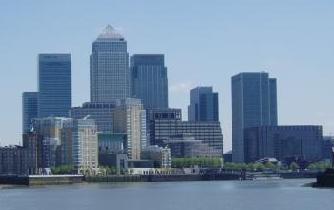Docklands IT density could be disastrous
The density of data centres and peering connections in the Docklands could be disastrous for firms who can't afford expensive contingency plans, warns Lumison.


With such a dense concentration of peering and data centres in the Docklands, disasters - such as flooding or terrorism - could wreak havoc on the UK's internet infrastructure, the chief executive of business internet service provider Lumison has said.
While most firms have backups in different locations, Aydin Kurt-Elli has warned against having too much centralisation in the UK's internet peering connections and data centres.
"The internet in the UK is quite different from the US," said Kurt-Elli, explaining that bandwidth maps showing density highlight the problem the UK faces. "It's higher through London than anywhere else in the world. It's all concentrated via London, and especially in the Docklands... in the US, peering points are everywhere."
Focusing so much infrastructure in one physical location reduces network resiliency, he said, noting the irony that the internet was originally developed as a way to provide resiliency to communication networks between missile silos. But he added: "It's designed to cope with one location being taken out."
"Knowing all this, they keep on adding more and more concentration in the Docklands area," Kurt-Elli said. "It just makes it a larger and larger single point of failure."
Kurt-Elli suggested two scenarios where the concentration in the Docklands could be a problem for UK internet infrastructure.
The first is flooding. With the Thames Flood Barrier aging, some believe the Docklands faces the same fate as communities along the Thames and Severn which have faced rising waters lately.
Get the ITPro daily newsletter
Sign up today and you will receive a free copy of our Future Focus 2025 report - the leading guidance on AI, cybersecurity and other IT challenges as per 700+ senior executives
The second scenario Kurt-Elli noted was terrorism. "Terrorists could do a lot more damage chucking a hand grenade in a manhole in the Docklands than anywhere else," he said.
If such disasters struck the Docklands, local internet peering connections would be taken out. Larger or more expensive data centre or internet firms, with backup infrastructure and connections in places such as Manchester, would face slower service, he said. But smaller firms without proper backup plans would be effectively shut down - especially small businesses which relied on hosted online applications such as Salesforce.
Quocirca analyst Clive Longbottom agreed that larger firms have recognised the potential risk and have invested in well-backed up systems.
"Most of them have peering arrangements with data centres which are nowhere near London," he said. For most providers, fire, flood or some other disaster which would damage the docklands would likely just affect network speed, he added.
Indeed, the extra cost of a well-run data centre or internet infrastructure will buy pumps to get rid of excess water, the ability to raise floors to keep hardware dry, and multiple in and out data lines, in case one is damaged. In addition, they'll have agreements with companies outside of London in case failure does occur, Longbottom said.
But he warned that some data centres can't afford the cost of peering to multiple sites, and are left with all their connections in one geographical area. "Anyone who is stuck with that will find they are cut off," Longbottom said. "People spend large amounts of money on 100 per cent availability."
And he noted the recent rolling blackouts in California, which took out big name sites such as Craigslist. "It brought everything down like dominoes," Longbottom said. "But there should be enough capacity in the UK that the worst would be slower network speeds and confusion."
"It's always worth asking," he added. "What if the only data backup is on the banks of the Severn - it's jumping from the frying pan into the fire."
Freelance journalist Nicole Kobie first started writing for ITPro in 2007, with bylines in New Scientist, Wired, PC Pro and many more.
Nicole the author of a book about the history of technology, The Long History of the Future.
-
 Should AI PCs be part of your next hardware refresh?
Should AI PCs be part of your next hardware refresh?AI PCs are fast becoming a business staple and a surefire way to future-proof your business
By Bobby Hellard Published
-
 Westcon-Comstor and Vectra AI launch brace of new channel initiatives
Westcon-Comstor and Vectra AI launch brace of new channel initiativesNews Westcon-Comstor and Vectra AI have announced the launch of two new channel growth initiatives focused on the managed security service provider (MSSP) space and AWS Marketplace.
By Daniel Todd Published